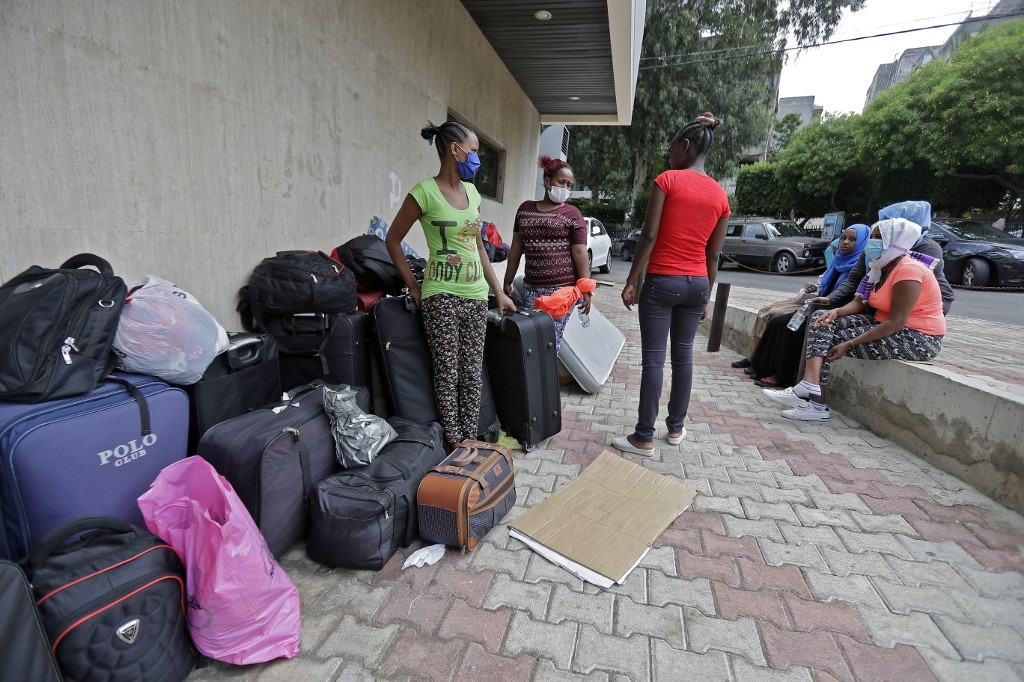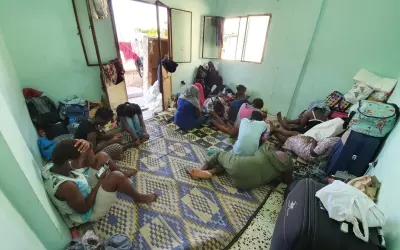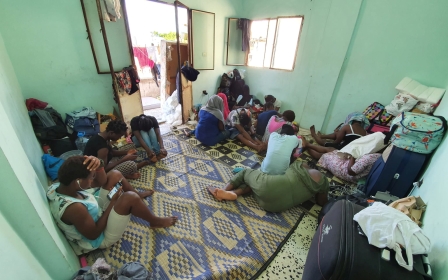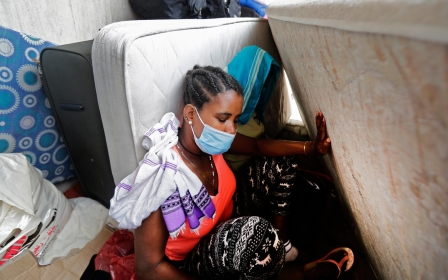Beirut explosion: Kafala system leaves African workers stranded in city in ruins

West African domestic workers desperate to return home since a chemical explosion tore through Beirut are finding themselves trapped by the stringent terms of Lebanon’s kafala system which grants employers an immense say over their lives.
Thousands of domestic workers have been abandoned in the last few months by employers hard hit by an economic crisis compounded by the coronavirus pandemic, forcing many to sleep rough or seek shelter in cramped and unsanitary quarters.
New MEE newsletter: Jerusalem Dispatch
Sign up to get the latest insights and analysis on Israel-Palestine, alongside Turkey Unpacked and other MEE newsletters
The 4 August blast that heavily damaged entire neighbourhoods of Beirut and left some 300,000 people homeless has only made the workers more anxious to go. But some have told MEE that unscrupulous employers are doing all they can to cling on.
A Sierra Leonean woman who was imprisoned in the bathroom by her employer has been unable to retrieve her passport. A Ghanaian woman said she cannot leave the country unless she returns to an employer who has not paid her in months.
Ghana and Nigeria have announced plans to repatriate their nationals. Still, Nigeria’s ambassador to Lebanon told MEE that his embassy has been overwhelmed by the sheer numbers wanting to return. Meanwhile, 53 Gambian women have yet to hear word from their government.
'We just want to go home'
Lebanon hosts at least 250,000 migrant workers, mainly from Africa and Asian nations, who work in private homes under the exploitative kafala (sponsorship) system. Widespread across Lebanon and parts of the Middle East, the kafala system ties the individual worker to a local national employer who controls the movements of their employee. This includes holding on to the worker's passport and controlling whether they can change employers or leave the country.
Instances of abuse are common, and it has been estimated that two migrant workers die each week in Lebanon, often through suicide or while attempting to escape. Those who are able to flee face imprisonment or heavy fines.
As an economic crisis took hold last year, the value of the Lebanese pound has tumbled, leaving some domestic workers without work, while others continued to labour for free in exchange for accommodation.
'It felt like a war when the explosions happened'
- Lucy Turay, domestic worker from Sierra Leone
Lucy Turay from Sierra Leone was let go by her employer in February, and now shares a house with 39 other Sierra Leonean women. On the day of the explosion, she recalled the apartment shaking from side to side as the two small rooms housing the women filled with screams and panic.
“It felt like a war when the explosions happened. The wind threw us back and everything changed in seconds,” Turay recalls.
The 28-year-old, who has a diploma in business administration, had been lured to Lebanon with the promise of work as a teacher. Instead, she was made to serve an employer who beat her and locked her in the bathroom, forcing her to drink from the toilet bowl.
When the economic crunch came, she wasn’t paid for several months and was dumped on the pavement as her employer's car sped off.
Things were already bad, but the explosion has only made them worse, she says.
“The pressure on us has increased from 30 to 90 percent. Some of us were injured in the blast. We’re very scared.
“We just want to go home.”
But Turay is in limbo. Even if she could afford the $500 needed to return to Sierra Leone, she cannot travel because her employer still holds her passport.
What’s more, since she left, her employer accused her of stealing - a charge that is commonly deployed to deter Lebanese authorities from granting workers clearance to depart.
“The moment I ran away, my madame accused me of stealing,” said Turay, referring to her employer.
“I have never taken a single penny from this woman or her home. She has my passport too, so I can’t do anything about it.”
Criminalisation
Osei Love’s employers had agreed to pay her $200 a month when she arrived from Ghana. Instead, she received $300 for eight months’ work.
When her employer proposed to pay her $15 per month amid currency shortages, she quietly packed her bags and left.
“When I ran away, I didn't take my passport because I don't want her to know that I am running away," she tells MEE.
Love, who has a young son to support, now finds herself in limbo as well and is unwilling to accept her former employer's terms.
“She has said to me that I have a contract and that I should finish the contract first before I can go home. But I am not going to work for nothing.”
Tsigerda Birhanu, an aid worker with the Beirut-based Egna Legna group dedicated to helping migrant workers, has come to the aid of the stranded women, but says her help is not enough.
'They don’t want our aid. They want to find a way to go home'
- Tsigerda Birhanu, Egna Legna aid worker
“We have been providing aid to these women and doing outreach work to give them all the support they need after the explosion,” Birhanu told MEE. “But they don’t want our aid. They want to find a way to go home.”
Birhanu said that while her organisation could help the women go back, its efforts were frustrated by the kafala system, which criminalises domestic workers who leave without their employers' permission.
“We have the money to help provide for the ticket but they all need the employer’s permission,” Birhanu explains. “If they don’t get permission, then they will end up in jail.”
Demands
As protests raged against Lebanon’s ruling elite in the wake of the explosion, domestic workers stepped up their demands for immediate repatriation. Kenyan domestic workers were seen demonstrating outside their consulate last week, while long queues formed outside the Nigerian embassy.
Goni Zannabura, Nigeria’s ambassador to Lebanon, told MEE that 69 Nigerian domestic workers were repatriated last week alone, but that since the explosion, the embassy was struggling to cope with the numbers needing assistance and repatriation.
“The embassy is handicapped, we don’t have money to accommodate them or buy them tickets. We did it before, we accommodated them for nearly five months, but now we cannot do it as an embassy,” he said.
'There are so many in Lebanon, that if you send 200 home today, maybe next week you will get another 200 turning up'
- Goni Zannabura, Nigerian ambassador to Lebanon
A flight repatriating some Nigerian women left on Sunday, with another due to leave at the end of this month. A third is set to take off in mid-September. The Lebanese-Nigerian community chipped in and bought 150 tickets, Zannabura said.
“There are so many in Lebanon that if you send 200 home today, maybe next week you will get another 200 turning up,” he added.
According to reports last week, five Nigerian women, one of whom was injured in the blast, were prevented from boarding a flight.
“What is delaying the returns is the permission of their boss,” said Enebeli, a Nigerian anti-trafficking activist based in Beirut who did not want to give his full name.
“The Nigerian embassy is trying to sort out allegations such as leaving or stealing so they don’t get detained at the airport.”
'The whole world knows that this is slavery. Why are they perpetuating this evil?'
- Patricia, This Is Lebanon
So why are employers preventing them from leaving?
Patricia, a member of the This is Lebanon coalition of former domestic workers, says employers are afraid to go without a helping hand.
“They'd have to clean up their own glass and do their own dishes, and they can't bear to let the worker who serves them 24/7 go,” she said.
“Employers who haven't paid their worker for months still insist that she has broken the contract by asking to leave. They justify the slavery by telling themselves they'll pay her 'when the dollar improves'.
“The whole world knows that this is slavery. Why are they perpetuating this evil?”
Middle East Eye delivers independent and unrivalled coverage and analysis of the Middle East, North Africa and beyond. To learn more about republishing this content and the associated fees, please fill out this form. More about MEE can be found here.






